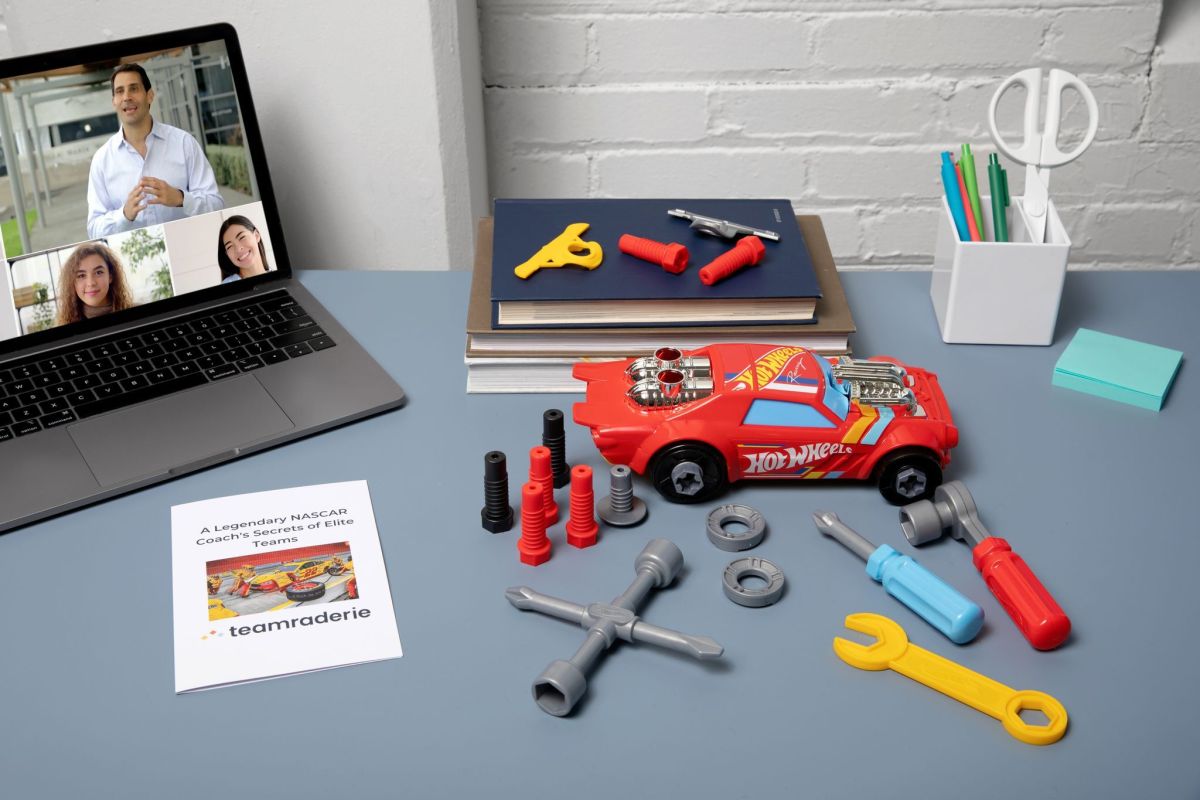The growing trends of hiring and running remote workforces, and more recently the major upheaval of restructuring across a number of industries, have redefined and disrupted the concept of teams at work. Even as some return to the office, many of us don’t see each other face-to-face, and even if we have checked in together virtually or in person, our groups of colleagues might be rapidly shifting around. Now, a startup that’s built a platform to run events to help work teams feel more connected to each other is announcing some funding on the back of strong demand for itself services.
Teamraderie, which provides short, live virtual classes and other content led by experts across different categories used in team-building events alongside software to manage the experiences and run feedback on the impact of the events, has raised $7 million, funding that it will be using to expand its platform with more content and to more customers.
The startup’s roster of stars running 45-minute courses includes icons like former gymnasts Nadia Comaneci and Bart Conner, Pulitzer Prize-winner Marcia Chatelain and Chess Grandmaster Garry Kasparov; and it counts Google, IBM, Twitter, Cisco, Microsoft and Intuit among its 200 customers, and says that it has run classes covering some 50,000 people to date across some 50 countries. (Pricing for the service starts at $300 and varies depending on the content, number of users and whether the company is a subscriber or using Teamraderie à la carte.)
Founders Fund is leading the round, and Teamraderie said that a raft of more than 12 “Chief Human Resource Officers and Chief People Officers” are also participating (which speaks to who it targets as customers). The company has now raised around $9 million, and from what we understand, this Series A values the company at around $60 million.
The rise of Teamraderie is coming at a moment of rapid evolution in the world of work, buffeted as it has been by the forces of COVID, layoffs and changing consumer habits.
The wider category of “productivity software” has definitely had a boost to address the shift in how we work today — Zoom has become a kind of palimpsest for a wide range of video collaboration tools; Slack is one of dozens of virtual chat platforms; workflow and project management have gone well beyond Asana and Trello; and so on and so forth. But even when all the other productivity boxes have been checked, Teamraderie speaks to another challenge that exists in the workplace, specifically the knowledge worker workplace, that of improving our relationships with each other as a route to working better together.
At its heart, Teamraderie is a little like MasterClass-meets-LinkedIn Learning, but focused just on business users and potentially used with physical props used as part of the session.
As with other team-building concepts, the idea is to place people into unfamiliar environments, and away from discussions related to their actual work, to refocus their attention on working together, thinking collaboratively and getting to know each other better. (One example: A NASCAR presenter who — in the words of Michael McCarroll, Teamraderie’s CEO and co-founder — “reinvented the tire change” will lead a team through a tire change on a car model.)
“Our reason for being is to ensure that teams can really collaborate effectively,” McCarroll said in an interview. Teams have a whole range of relationships, and it can be a challenge to really get to know people and understand different perspectives when either your team is shifting around, or you don’t work directly with everyone in a physical environment, he continued: “We want to get teams to a point where every member sees every other member as human. If you feel more connected and understand and care what other people have to say on your team, you get more value.”
Alongside the media and content aspect of its platform, Teamraderie also provides tech to measure the effectiveness of the sessions. McCarroll said that this, and the main concepts behind Teamraderie, have been built out of research from Harvard Business School, Stanford University, MIT and the University of Chicago around productivity, support and inclusiveness in the workplace. But because these will be those, in our quantified workplaces and world, that will need to know the impact and the ROI for all of this, the idea will be to invest in building more tools to help improve those measurements, too, and to use that to continue growing Teamraderie.
“We use data to customize and develop the product,” McCarroll said. “We’re not just a content company.”
There may also be more investment made in aid of scaling all of this, too. Today the “sweet spot” for the most effective class sizes is 15 or fewer participants, McCarroll said, with larger groups in general tending to what he referred to as “social loafing” — that is, no longer engaging. This presents an interesting challenge to Teamraderie (and really to any tech product aimed at improving remote productivity): how can you get the same impact while delivering your product to groups larger than this?
Keith Rabois, who led the investment for Founders Fund, said in an interview that the funding environment for startups, regardless of whether it is early- or later-stage, is most definitely tightening up. He said that in 2022 so far, he’s offered “only two term sheets to new companies” (not including those already in the portfolio), versus “twelve or thirteen” by this point in 2021. Teamraderie was an easy investment, though, not just because it’s doing something different, and seeing traction with notable customers, but because of the unit economics. “It’s basically breakeven, which is unusual for a company at this stage of growth,” he said.
